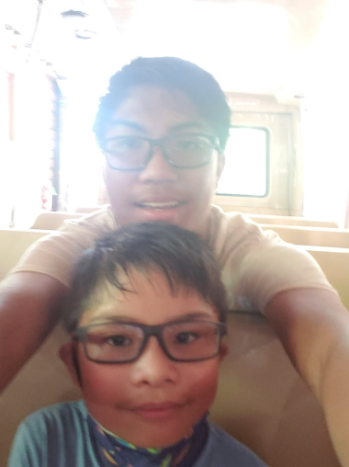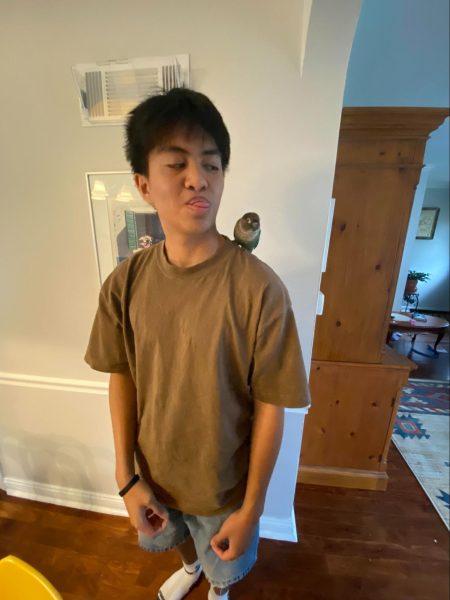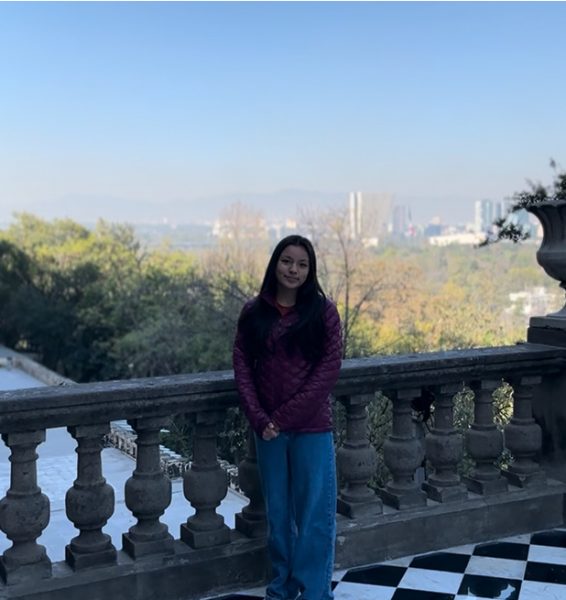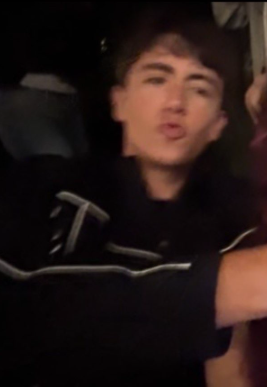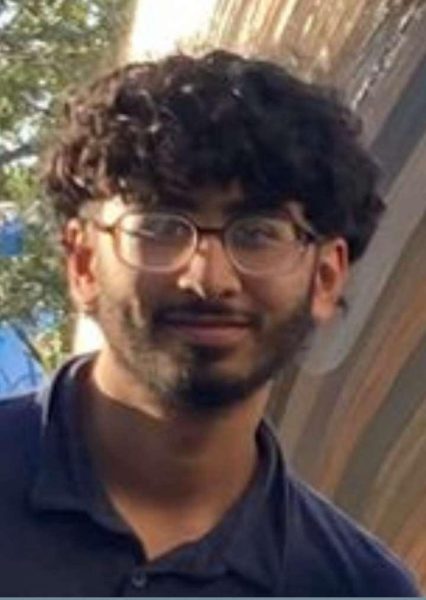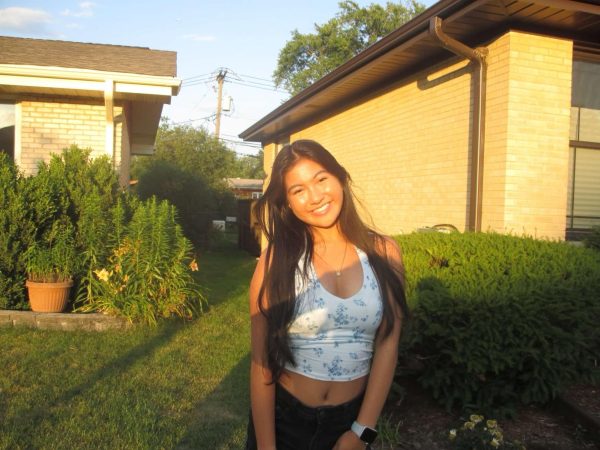James Mahia, Junior
What is your name and grade? I’m James Mahia and I am a junior right now.
What experience or memory initially sparked your passion for math and science? I think my first ever memory was when I was in this airport and I saw this giant, whatever you call it beluga white thing that was blue and white and had triangles on it. It’s like driving, it’s flying, like what in the world is that? And so, I didn’t know at the time that it was a Boeing 747 by Korean Air at ORD. And I was like, I wanna do that. I don’t know what in the world that is, but I wanna do that. That kind of fascinated me a lot and as time went on, the more I was curious about the world, the more I experimented. I experimented playing with electricity, conducting it using electronics, building electronics and Legos and that kind of brought more and more onto me and exploring the world of STEM that I grew fond of. Though I didn’t exactly know how to channel that, I did more computer science stuff because my dad once sat me down and told me the story about how he came to America. He was like, “Hey, I want to go to Devry and I want to go to a computer science school. I have a civil engineering degree, I could be 100 percent great here.” And he came here and then not only were all the jobs gone since it was about to be 2008 in a few years but also, no one really accepted his degree because he was from the Philippines. Despite having a civil engineering degree, he was like, “You know what? I’m gonna learn something new. I’m gonna do what all these billionaires, what all these successful people do. I’m gonna go to computer science school.” And he applied to Devry, got all his books together, became a freshman there and then he dropped out of computer science school. Now, the thing about it was that he was smart, he was intelligent, he was hard working. The only thing that he didn’t have was English. Of course, he could do whatever math he wanted, but he couldn’t even read his own books. He could barely read his books, he could barely understand his lectures, he could barely understand his own peers. So I was like, “Huh, maybe I should try that.” And then I went online and did some coding problems and I was like, “This was pretty fun.” And then my dad was like, “You have something in you. Go for it.” And I was like, “What? What do I have in me?” He said, “Dude, go continue programming. Sign up for AP Computer Science Principles.” And I was like, “I don’t know, Dad.” But as time went on, there was this love for education that I kind of had because if we agree that education is a right and not a privilege, then everybody has to contribute to that in their own certain way. Whether it be coaching people, whether it be talking about books, or writing books for that matter, you need to find your own way of educating, so I was like, “What exactly should I educate about?” And over time, it kind of grew within me. And so let’s think back to 2020. We were all chilling, Memorial Day, 6:28 pm. And for me, I was watching MASH and then all of a sudden, I got bombarded with all this hate speech, gore, homophobia, white supremacy, again and again and again. My father didn’t get into computer science school. That’s a right because if we here in America think that we can achieve supreme merits, then how come he didn’t even get into school? Even though he was qualified and he was so smart, he still didn’t get in. That was stolen from him, and then I was like, “Hey, let’s build. But I don’t just want to build computer applications. I don’t just want to build algebra skills and whatnot.” Sure, all of that can be fun but instead of just building applications, let’s build communities. Let’s build on those principles because the best students in the world, of course, go into Ivy Leagues. Of course, they sacrifice and they work hard and they do whatever just to prove they’re better than other students. And that’s great for them. But students who are out there, who focus more on collaboration than competition, and have the discipline to do that, they may not be the best students in the world, but they are the best students in the world and I want to create those students. So I just really want to educate the world about computer science, STEM, whatever that may be, not because that’s what my family heritage is, about being all engineers and STEM. No, it’s because that was the biggest thing stolen from me and my family and I don’t just want to keep that education, I want to share it.
How has your experience as a Point tutor changed your perspective on Niles North? Basically, when people think about community service, they think it’s all about service hours or college applications. Tutoring also kind of seems like you’re just assisting a teacher like it’s not really much. And people are like, “Well James, you talk about math and computer science all the time. You know you can make bank off of that, right? All that money is right there, all those things are there. You don’t really need to spend your time educating, you just need to get on with that bank.” And also, you get to prove that you’re really smart to others because you can explain all these things and you can show this concept. And sure, that’s great. But we don’t really talk about the insight that I get from tutoring. I don’t know, let me make up a name. Let’s say Amy came into the Point one day and I talked to her about something like factoring or amplitude. That would be pretty fun for me to talk about, but she also came in here and talked about her story and how she’s from another school in California and how it’s completely different here. That is much more rewarding than me trying to find the asymptote of a tangent graph or something like that. So trying to see other students’ hopes and dreams, and getting an insight into their lives, is extremely precious and much more rewarding and interesting than whatever math and computer science could pretty much throw at me. [The personal interactions and the learning process] kind of join hand in hand. I help be the best tutor that I can be, and the best educator that I can be. And in return, I get to have more insight into other people, which is honestly a big part of why I love doing what I do.
What is your favorite part about Dungeons and Dragons and why? Honestly, if you play Dungeons and Dragons like me, and you just unironically say that you like the game, you’re pretty much a nerd. But I would say I’m pretty much a nerd that does not care about what anybody else thinks. I know it’s nerdy, but I do not care at all and that resilience is like, “Yeah, I do this. I love to do this. And I don’t care what you think of me.” Because it’s something that I like and I don’t care at all. Now for Dungeons and Dragons, it’s not something I’m gonna die with or a passion I bleed for. It’s really more of like a fun side project to have a break from whatever happens in life.
What are your post-secondary plans after high school? I’m probably gonna major in something related to computer science or computer engineering, but I’m still trying to figure that out. And then I’ll also try and get an internship. If I like office work and I make an application that has to do with education or further education or research, then I probably will just stay a bachelor. If not, I’ll try and get a masters in secondary education. And hopefully, fingers crossed, school leadership. My fingers are crossed, but regardless, grad school is a huge undertaking.
Which song best describes your personality and why? St. Elmo’s Fire by John Parr is the first one that comes to my mind. I just imagine myself having a passion and I know it’s super cliché to have a symbol for passion be a fire, but honestly, that’s pretty much it. And so, I imagine using that passion to overcome obstacles. It’s just a random song that I randomly listen to while I do my work.
What is your favorite hobby to pursue in your free time?I love to read, read, read everything but especially autobiographies. I absolutely adore autobiographies.
What has been your fondest memory at Niles North thus far? I firmly believe that my fondest memories have come through times of turmoil. And so I remember during my time in Student Council, we had the whole controversy with Niles West and that anti-mask protest. And I remember hearing about the ways the Student Council was trying to respond and in the end, we decided to have a sit-in protest in the auditorium. I needed to do my best in order to protect the school community because that’s what I want to do, that’s what I need to do and if I’m not doing that at Student Council, then why am I even here? So I remember that I sent out a letter that Ms. Benjamin ultimately sent out, calling on the school community to protest all these people at West who were literally going to Latinx and Black students making monkey noises and saying the N-word. I felt like we had to respond to that and stand in solidarity, which kind of sounds ironic looking back because it was a sit-in protest. But that’s what I did, that’s what I’m now really passionate about. So I ran around the school and went to various clubs, saying “Please come here.” I remember after that email was sent out and the Student Council did its thing, and BSU did its own campaign. A few other clubs started to join in and from there, a few things stood out to me. One is seeing the list of all the clubs that got involved. We saw this list after list after list of all the clubs standing in solidarity. We had everything from BSU to Student Council, to SOAR, to even an ESports team supporting this. MSA supported this, and AGAPE supported this, which then turned into H20. All these different clubs based on religion and culture, even if they seemed unrelated like E-Sports, they were all on that list. When I was going to the auditorium, I never expected there to be a wait to get inside. The entrance was all clogged in and I was pretty much trying not to suffocate from the amount of people that were there. When I came in, it was just filled to the brim with students. Students, who might have had study halls or whatever, all metaphorically stood in solidarity with what happened to West. Looking back at it, I talked to Ms. Andrisakis about it and she said if there was one classroom with more students, we would have had to turn people away from the event because it was that packed. And I was like, “Wow, the amount of solidarity and strength between unity.” Not only was it special for me to be a part of that, but to see other people from all these different walks of life coming together probably has to be one of the proudest achievements that I’ve ever made in my life, to be honest.
If you could give your freshman self any piece of advice for the future, what would it be? I would say, “Just chill out, okay.” It’s great that you want to be successful, that you’re going to a lot of programs and you’re seeing a lot of great people but ultimately, that’s not gonna do you well in the long run. Before then, when I was a freshman and sophomore, I had a very bad workaholic mindset. My mental health suffered and my social health suffered, so that was pretty rough. And then I remember one time I was just lying in bed and thought to myself, “How come I’m not successful? I’ve put in my heart, my soul, I’ve sacrificed everything. Why in the world am I losing the race in life?” And I don’t know what voice in my head said this but it just basically said to me straight up, “James, the reason why you’re so far behind in life is not because people were ahead of you. It’s not because you didn’t leave people in the dust, you left yourself in the dust. You didn’t take care of yourself, you didn’t work on socializing a lot so you were a workaholic. And being a workaholic didn’t make you farther ahead in life. In fact, it made you pretty much in last place. You were the farthest person out of everybody else here not because others didn’t believe in you, but because you didn’t believe in yourself.” And I literally cried, and I cried, and for days on end, I was just crying because I just thought, “Wow, what have I done?” I’m not saying I wasn’t successful, but I just had a change in perspective of how workaholism doesn’t give you liberty, it pretty much keeps you in slavery.
If you could change one key aspect of Niles North to be enacted in future years, what would it be? I would probably put forward first and foremost way more psychological help than ever before. Currently, I’m the head of Mental Health for the Student Council and we have a lot of students who need help with some problems here and there. What I specialize in is the Student Services department and anything that has to do with mental health and trying to get students access to outside resources, such as mental health and family services down the road. But the systems here at Niles North are definitely not adequate enough and the interns can also agree with this too. We only have five full-time psychologists with a few interns. In a school of 2,100 students, people came up to the Student Council and they were like, “Hey, we really need a lot of psychologists.” Especially considering that they don’t even have an opening for more psychologists at the moment, and the interns are leaving, even if they wanted to stay, there are no openings. The amount of people who are in the school are rising, but the amount of people that are needed is just staying the same. And as a result of that neglect, there are a lot of students who really need that psychological support. I know one student who literally had a family member die, and then when she went to the Social Services department, a psychologist came out and she said, “Hey, I need some help.” And they were like, “Okay, we’ll see you tomorrow during homeroom and we’ll talk about it.” And she does, she goes there during homeroom the next day, and then she leaves after they said, “Great, we’ll contact you later.” But no one ever came. This was years ago by the way, and we haven’t really heard about it since. But we fought to let her voice be heard more because it was just completely not the right move for the district to not have enough psychologists to handle students in crisis. Now of course, I’m not a therapist but seeing that the student who was going through a family loss only got ten minutes of psychological treatment is definitely not more than adequate. And another student who needed to see a psychologist for his own mental health needs, he went and he was like, “Hey, I need some help right now.” And the psychologist there was literally pretty much eating as he was helping. Because there are so few psychologists, that’s what they need to resort to in order to give help, that they don’t even have a meal in order to give support to these students. And so, I would definitely increase the number of psychologists in this school one hundred percent.
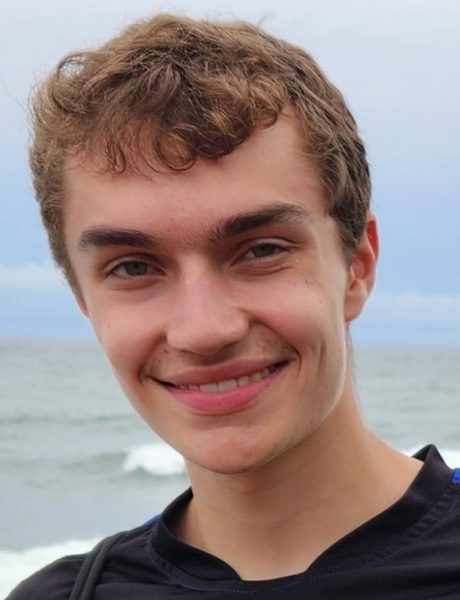
Aiden is a senior who serves as the Editor-in-Chief and News Editor of North Star News. Since first joining the staff during his freshman year, he has...


